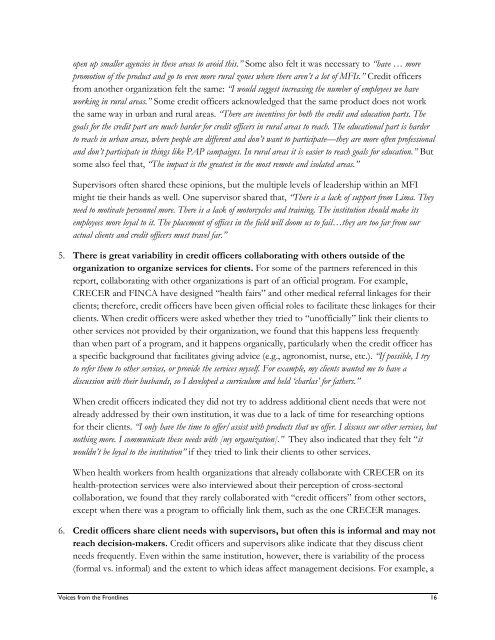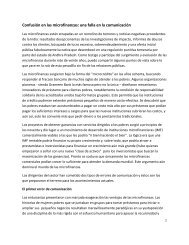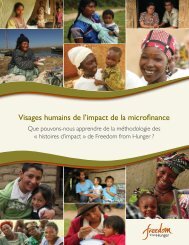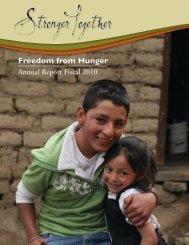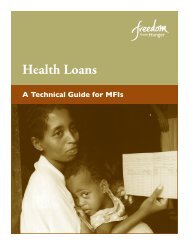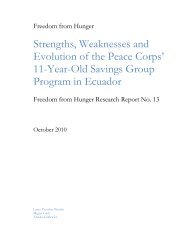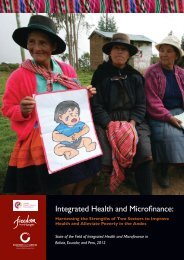Voices from the Frontlines: - Freedom from Hunger
Voices from the Frontlines: - Freedom from Hunger
Voices from the Frontlines: - Freedom from Hunger
Create successful ePaper yourself
Turn your PDF publications into a flip-book with our unique Google optimized e-Paper software.
open up smaller agencies in <strong>the</strong>se areas to avoid this.” Some also felt it was necessary to “have … more<br />
promotion of <strong>the</strong> product and go to even more rural zones where <strong>the</strong>re aren’t a lot of MFIs.” Credit officers<br />
<strong>from</strong> ano<strong>the</strong>r organization felt <strong>the</strong> same: “I would suggest increasing <strong>the</strong> number of employees we have<br />
working in rural areas.” Some credit officers acknowledged that <strong>the</strong> same product does not work<br />
<strong>the</strong> same way in urban and rural areas. “There are incentives for both <strong>the</strong> credit and education parts. The<br />
goals for <strong>the</strong> credit part are much harder for credit officers in rural areas to reach. The educational part is harder<br />
to reach in urban areas, where people are different and don’t want to participate—<strong>the</strong>y are more often professional<br />
and don’t participate in things like PAP campaigns. In rural areas it is easier to reach goals for education.” But<br />
some also feel that, “The impact is <strong>the</strong> greatest in <strong>the</strong> most remote and isolated areas.”<br />
Supervisors often shared <strong>the</strong>se opinions, but <strong>the</strong> multiple levels of leadership within an MFI<br />
might tie <strong>the</strong>ir hands as well. One supervisor shared that, “There is a lack of support <strong>from</strong> Lima. They<br />
need to motivate personnel more. There is a lack of motorcycles and training. The institution should make its<br />
employees more loyal to it. The placement of offices in <strong>the</strong> field will doom us to fail…<strong>the</strong>y are too far <strong>from</strong> our<br />
actual clients and credit officers must travel far.”<br />
5. There is great variability in credit officers collaborating with o<strong>the</strong>rs outside of <strong>the</strong><br />
organization to organize services for clients. For some of <strong>the</strong> partners referenced in this<br />
report, collaborating with o<strong>the</strong>r organizations is part of an official program. For example,<br />
CRECER and FINCA have designed “health fairs” and o<strong>the</strong>r medical referral linkages for <strong>the</strong>ir<br />
clients; <strong>the</strong>refore, credit officers have been given official roles to facilitate <strong>the</strong>se linkages for <strong>the</strong>ir<br />
clients. When credit officers were asked whe<strong>the</strong>r <strong>the</strong>y tried to “unofficially” link <strong>the</strong>ir clients to<br />
o<strong>the</strong>r services not provided by <strong>the</strong>ir organization, we found that this happens less frequently<br />
than when part of a program, and it happens organically, particularly when <strong>the</strong> credit officer has<br />
a specific background that facilitates giving advice (e.g., agronomist, nurse, etc.). “If possible, I try<br />
to refer <strong>the</strong>m to o<strong>the</strong>r services, or provide <strong>the</strong> services myself. For example, my clients wanted me to have a<br />
discussion with <strong>the</strong>ir husbands, so I developed a curriculum and held ‘charlas’ for fa<strong>the</strong>rs.”<br />
When credit officers indicated <strong>the</strong>y did not try to address additional client needs that were not<br />
already addressed by <strong>the</strong>ir own institution, it was due to a lack of time for researching options<br />
for <strong>the</strong>ir clients. “I only have <strong>the</strong> time to offer/assist with products that we offer. I discuss our o<strong>the</strong>r services, but<br />
nothing more. I communicate <strong>the</strong>se needs with [my organization].” They also indicated that <strong>the</strong>y felt “it<br />
wouldn’t be loyal to <strong>the</strong> institution” if <strong>the</strong>y tried to link <strong>the</strong>ir clients to o<strong>the</strong>r services.<br />
When health workers <strong>from</strong> health organizations that already collaborate with CRECER on its<br />
health-protection services were also interviewed about <strong>the</strong>ir perception of cross-sectoral<br />
collaboration, we found that <strong>the</strong>y rarely collaborated with “credit officers” <strong>from</strong> o<strong>the</strong>r sectors,<br />
except when <strong>the</strong>re was a program to officially link <strong>the</strong>m, such as <strong>the</strong> one CRECER manages.<br />
6. Credit officers share client needs with supervisors, but often this is informal and may not<br />
reach decision-makers. Credit officers and supervisors alike indicate that <strong>the</strong>y discuss client<br />
needs frequently. Even within <strong>the</strong> same institution, however, <strong>the</strong>re is variability of <strong>the</strong> process<br />
(formal vs. informal) and <strong>the</strong> extent to which ideas affect management decisions. For example, a<br />
<strong>Voices</strong> <strong>from</strong> <strong>the</strong> <strong>Frontlines</strong> 16


